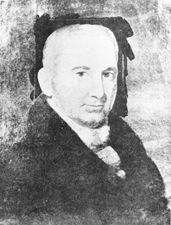John Milledge
| John Milledge | |
|---|---|
 |
|
| President pro tempore of the U.S. Senate | |
|
In office January 30, 1809 – May 21, 1809 |
|
| Preceded by | Stephen R. Bradley |
| Succeeded by | Andrew Gregg |
|
United States Senator from Georgia |
|
|
In office June 19, 1806 – November 14, 1809 |
|
| Preceded by | James Jackson |
| Succeeded by | Charles Tait |
| 26th Governor of Georgia | |
|
In office November 4, 1802 – September 23, 1806 |
|
| Preceded by | Josiah Tattnall, Sr. |
| Succeeded by | Jared Irwin |
| Member of the U.S. House of Representatives from Georgia's at-large district |
|
|
In office March 4, 1795 – March 3, 1799 |
|
| Preceded by | Thomas P. Carnes |
| Succeeded by | Benjamin Taliaferro |
|
In office March 4, 1801 – May 1802 |
|
| Preceded by | James Jones |
| Succeeded by | Peter Early |
| Member of the U.S. House of Representatives from Georgia's 1st district |
|
|
In office November 22, 1792 – March 3, 1793 |
|
| Preceded by | Anthony Wayne |
| Succeeded by | None, seat eliminated |
| 4th Attorney General of Georgia | |
|
In office 1780–1781 |
|
| Preceded by | Williams Stephens |
| Succeeded by | Samuel Stirk |
| Personal details | |
| Born | 1757 Savannah, Province of Georgia, British America |
| Died |
(aged 60–61) Augusta, Georgia, U.S. |
| Political party | Democratic-Republican |
John Milledge (1757 – February 9, 1818) was an American politician. He fought in the American Revolution and later served as United States Representative, 26th Governor of Georgia, and United States Senator. Milledge was a founder of Athens, Georgia, and the University of Georgia.
John Milledge was born in Savannah, the grandson of an original settler of Georgia. He was tutored privately and studied law. After being admitted to the bar, he opened a law practice in Savannah. At the onset of the Revolutionary War, Milledge was part of a group that took colonial governor Sir James Wright as a prisoner in 1775. He also took part in a raid of Savannah's royal armory to procure gunpowder for the revolutionary cause. When the British captured Savannah, Milledge escaped to South Carolina, where American patriots nearly hanged him as a spy. He participated in the Siege of Savannah in an attempt to drive the British forces out. In 1778, he served as an aide to Governor John Houstoun in an abortive campaign against the British in East Florida. In 1781, as a colonel in the Georgia militia, he helped to recapture Augusta.
Milledge's political career began in 1779, when he was elected to the patriot general assembly. After serving as the attorney general of Georgia, Milledge was member of the Georgia General Assembly. While in the General Assembly, he spoke out forcefully against the Yazoo Land Acts. In 1792, the House of Representatives declared the seat of Anthony Wayne vacant due to disputes over his residency. Milledge was elected to the Second Congress to fill this vacancy and served from November 22, 1792, to March 3, 1793. Later, Milledge would be elected to the Fourth and Fifth Congresses, serving from March 4, 1795 to March 3, 1799. In 1801, he was again elected to Congress, this time as a Democratic-Republican, and served from March 4, 1801, until he resigned in May 1802 to become Governor of Georgia.
...
Wikipedia
